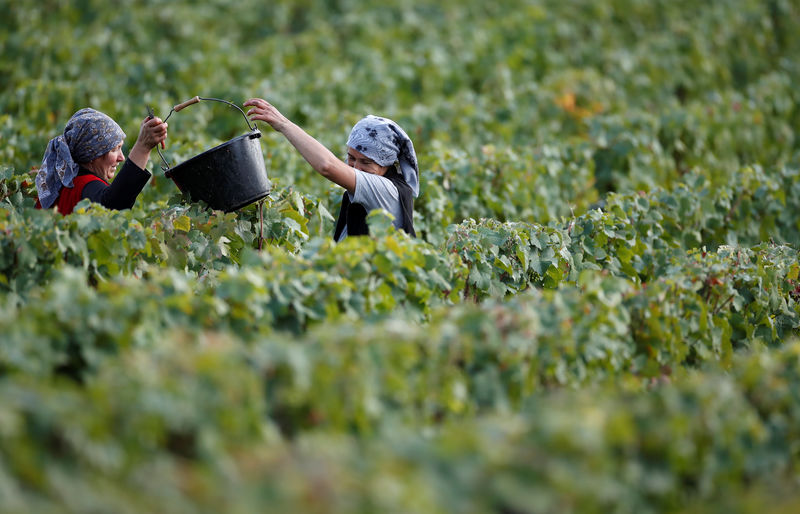AVIZE, France (Reuters) - Whatever hardships a 'no-deal' Brexit might inflict on Britain a champagne drought will not be one of them, according to French producers.
Makers of the sparkling wine say they have been stockpiling large numbers of bottles across the Channel in their biggest export market, and are confident that the British taste for fizz will be unaffected by any Brexit-related disruption.
Political turmoil in the United Kingdom has generated uncertainty over how, when and even whether it will leave the European Union. Its exit date is scheduled for Oct. 31.
"Champagne is champagne, it's like the Eiffel Tower," said Pierre-Emmanuel Taittinger, president of the eponymous champagne house, speaking in a vineyard as the grape harvest kicks off in the region. "The English have loved champagne for 300 years and, Brexit or no Brexit, they will continue to like it, this is something we have no question about."
The fall of the pound against the euro due to uncertainty over Brexit was a bigger concern than Brexit itself, Taittinger added.
Britain is champagne's largest export market, ahead of the United States, with a share of 17%. It imported a volume equal to 26.8 million bottles of champagne in 2018, down from 27.8 million in 2017, data from the Champagne Houses website showed.
Most producers have boosted their shipments to the UK since last year as they prepared for a 'no-deal' Brexit, which may lead to logistical hurdles or taxes on EU imports.
The prospect of the country departing without an exit agreement has prompted warnings from opponents of economic turmoil and even food shortages, though the government says such fears are exaggerated.
"Growers and houses have overstocked in Great Britain to fill a possible border closure if it were to occur," said Thibaut Le Mailloux, head of communication from the Comité Interprofessionnel du Vin de Champagne (CIVC), a trade body.
The group did not say how many extra bottles had been shipped to Britain.
Wine critic Antoine Gerbelle said there was enough champagne stockpiled to meet British demand for at least a year.
"There won't be a champagne crisis at Christmas," he said.
Smaller producers could be more exposed to Brexit than big houses as they face tough competition from cheaper sparkling wines such as Italy's prosecco and Spain's cava, which have caused a regular fall in champagne exports for more than 10 years.
Taittinger is among France's largest champagne producers, behind LVMH (PA:LVMH), the world's biggest luxury group and owner of the Moet & Chandon and Veuve Clicquot champagne labels.
It is the first French champagne maker to produce sparkling wine in Britain after buying land in Kent, southeast of London, in 2015. The first bottles are expected in 2024.
A drop in demand if free-spending financiers were to quit London's City financial district did not worry the producer, which sells champagne in 140 countries.

"The big banker, the big trader, who doesn't have a job in the City will go to Frankfurt, Paris, New York. The bottle he will not drink in the UK, he will drink elsewhere," said Taittinger director general Damien Le Sueur.